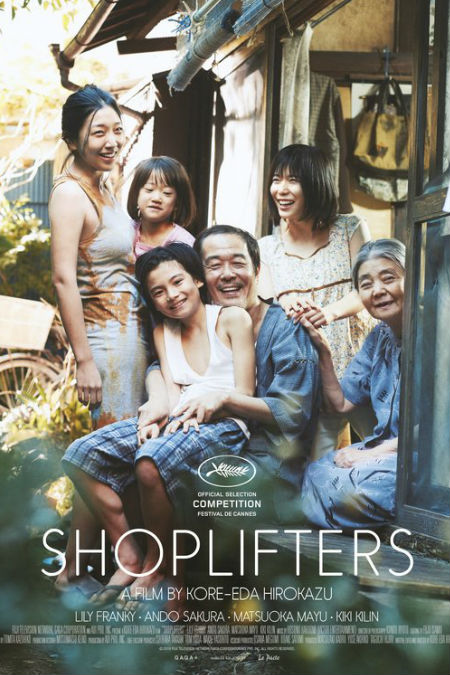
There are two ways to look at the close-knit family at the heart of writer-director Hirokazu Kore-eda’s quietly-spoken but emotionally powerful Palme D’or winning film, Shoplifters.
One, held by the police who eventually portray them as would-be murderers, scam artists and kidnappers, holds that they encapsulate everything that is wrong with society; the other, however, is that they are the very essence of what family is – loving, supportive, caring, imperfect but ultimately nurturing.
In every way that matters, it’s the second view that holds sway over the film’s utterly immersive 121-minute running time.
Granted, when we first meet the family of Osamu (Lily Frank) and Nobuya Shibata (Sakura Ando), you could be forgiven for doubting their bona fides as “Family of the Year”.
In a manoeuvre they have clearly executed on multiple occasions previously, to the point where they are well-oiled, expertly-choreographed thieving machine, Osamu and son Shota (Kairi Jō) are moving their way up and down the aisles of a buzzing grocery store.
Rather than waiting for the staff or fellow customers to be handily absent, they have confected a way of spiriting items into Shota’s backpack that is subtle and happens right out in the open; it’s so well-orchestrated that at the one point when Shota might be spotted, Osamu breezes in and places his decoy basket of groceries right in the line of sight of the one staff member who might spot what they’re doing.
It’s all over and done with elegant proficiency, bar Shota forgetting to pick up the all-important bottle of shampoo and the two return home picking up some croquettes, legally this time, to have with the family’s noodle dinner.
The family they return is obviously not flush with cash – mother Nobuyo, daughter Lin aka Aki (Mayu Matsuoka), grandmother Hatsue (Kirin Kiki), along with Shota and Osamu are crammed into a very small home, with everyone sharing a bed bar Shota who sleeps in what is for all intents and purposes a cupboard.

Yet for all the material privations, borne of low-skill blue collar jobs for Osamu and Nobuyo as a construction worker and industrial laundry worker respectively, theirs is as happy a life as they can obviously carve out from meagre resources.
It’s never simplistically presented as idyllic or bucolic; Kore-eda is far too sophisticated a storyteller for that and it would have this powerfully-affected, intelligently-delivered and nuanced story a disservice.
But there is a clearly a beating heart at the centre of this family that while recognising they are on the bottom rung of society and possibly sliding below that, that there is life and happiness to be had, criminally-underpinned though it might be.
How strong and all-encompassing that heart is, even in the face of the grim realities of life, becomes clear when, almost at home with hot croquettes in hand, Osamu spots a waif-like, clearly-hungry girl hiding in an alcove near their home.
Quietly-spoken Yuri (Miyu Sasaki) allows herself to be taken home to the Shibata’s small dwelling where she is initially greeted by Nobuyo as another burden the family can ill afford.
But hers is a rather benign objection, one that is quickly dissipated of any real sting when Hatsue scoops the little girl up and makes it clear she will be loved and cared for until morning when they’ll return her to her family, if they can be found.
It turns out they can be, but overhearing a fearsomely-abusive argument between Yuri’s parents, one which clearly implies the young girl in their care is an unwanted byproduct of a deeply-unhappy relationship, they take Yuri back home and she becomes part of their family.
It looks like some sort of fairytale ending but Kore-eda is too savvy for that too, weaving in indications, like familially-imperfect breadcrumbs, that the life of the Shibatas has some rather idiosyncratically-flawed issues.
Take for instance the fact that neither Lin nor Shota call their parents mum or dad, an omission that is a recurring topic of conversation for Osamu, who really wants to be given the parental appellation and Nobuyo who is far more relaxed about what she’s called.
It’s never made explicitly-clear why the two siblings wouldn’t use the fairly-conventional terms of “mum” and “dad” but you begin to realise that the Shibatas, for all their warmly-inclusive and supportive moments, maybe a found family of sorts rather than an organically-created one.

Whatever their genesis as a family, the Shibatas, materially-constrained by a lifestyle lived on the margins, seem happy; Shoplifters features a number of scenes that speak of the family’s devotion to each other, and their willingness to live in the moment whether it’s a stolen afternoon of sweaty summer sex of Osamu and Nobuyo or a trip to the beach where you realise that Hatsue has more than the usual reasons to be thankful for the family she now calls her own.
Kore-eda has crafted a beautifully-resonant film that speaks of what really makes a family, of our need to belong and to matter to someone, of the length people will go to make something worthwhile of life when all the cards in the deck are stacked against them.
The Shibatas are never deified or Pollyanna’d, the plot holes in their familially-happy narrative revealed in many small and meaningful ways but it’s clear they have managed to craft a family that matters to them, that gives their lives meaning in a way that eludes other more affluent families such as Yuri’s.
Life being life does catch up with them in ways that won’t be revealed for fear of spoiling the poignant ending, but suffice to say we are given a portrait of a family that touches the heart deeply, not in some manipulative way that reeks of movie-of-the-week syndrome, but in a manner that suggests it is possible to grab some happiness out of a situation seemingly inimicable to it.
Shoplifters is not a message-drive film as such, possessed as touched on before, by a script too emotionally-insightful and societally-observant to be that simplistic or rote; what it does do, in ways that quietly and yet profoundly move you, is pen a love letter to what family can be when people really need each other, when the construct is a haven rather than a naturally-occurring burden and when they really appreciate how good it is to have a haven in the awful storm that is life more often than it’s not.